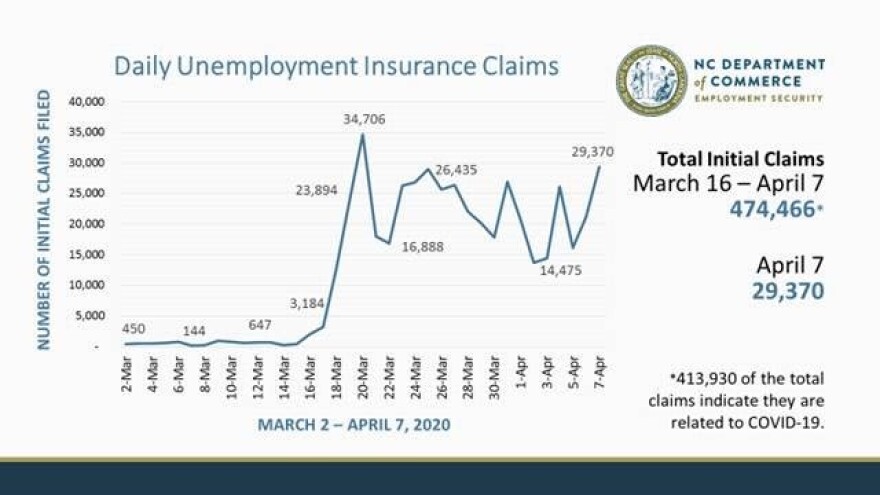North Carolina’s unemployment filings since March 16 hover just over 470,000, and about 87% of those claims are related to COVID-19. This amounts to years worth of claims that need to be processed in only a matter of weeks.
The state Division of Employment Security hired 350 additional staff and opened a new call center to handle the influx of applications, but many North Carolinians say they are still facing many problems while trying to file. WUNC Capitol Bureau Chief Jeff Tiberii shares his reporting on Gov. Cooper’s changes to unemployment eligibility requirements and how the federal CARES Act influenced eligibility in North Carolina. And how will this economic crisis affect the future of work?
Diane Lim is the director of outreach and senior advisor for the Penn Wharton Budget Model. She says young, low income and minority workers are on the frontlines of the current economic crisis, but she feels optimistic that workers will be able to bounce back once the stay-at-home orders are lifted.
I think the economy is going to change on the basis of this too. And there's gonna be a lot of destruction and creation across different types of industries and sectors. - Steve McDonald
Steve McDonald is a professor of sociology at North Carolina State University focusing on labor markets and economic inequality. Noncitizen workers and gig workers were already some of the most vulnerable laborers, he says, and the economic fallout of the COVID-19 pandemic will force a reckoning with weaknesses in American work culture.
Host Frank Stasio speaks with guests about the economic consequences of the pandemic and how work will change because of it.
Interview Highlights
Tiberii on the difficulties state unemployment office workers are facing:
You have these state employees who are doing … their absolute very best to process these hundreds of thousands of claims. And now plot twist: They're having to figure out how to verify and figure out how much money an Uber driver, for example, was making, or [how much] somebody who was self-employed was bringing in, so that they can check those folks out and connect them with federal benefits. And that's not been part of the state infrastructure. So it's layered, and it's complicated. And when you have half a million people who are applying for this relief, it's been an overwhelming moment.
Lim on what sets this economic crisis apart from recessions of the past:
I think that this experience is teaching everyone that sometimes there's no getting around a need for a strong, large role of government. This is a public crisis that can only be addressed through a very massive government intervention. - Diane Lim
A lot of these workers in the leisure and hospitality sector at least — they are still connected to their previous employers. In fact, they would probably label themselves as still working for those employers even though they're officially unemployed. That's because the hope is that the businesses can stay afloat, that the workers — even though they're not working and earning wages — can hang in there in terms of being able to pay their own bills. And that means that everyone can kind of be ready to get back to business more as usual, once the health crisis lifts for a bit.
McDonald on how this moment might change the future of work:
It would be good at least to start thinking about this as a potential new paradigm — the way that we're engaging in work — and rethink some of the types of policies that we have in place in order to address work-based issues. A lot of the social safety net provisions require that individuals are employed or looking for work. And I think this is potentially a problem in an economy where we see more fluidity with regards to what employment stability might actually look like. The other thing is health insurance being run directly through employers. This raises serious issues about whether or not in a new economy like this that this is an effective way to run policies to protect workers.








